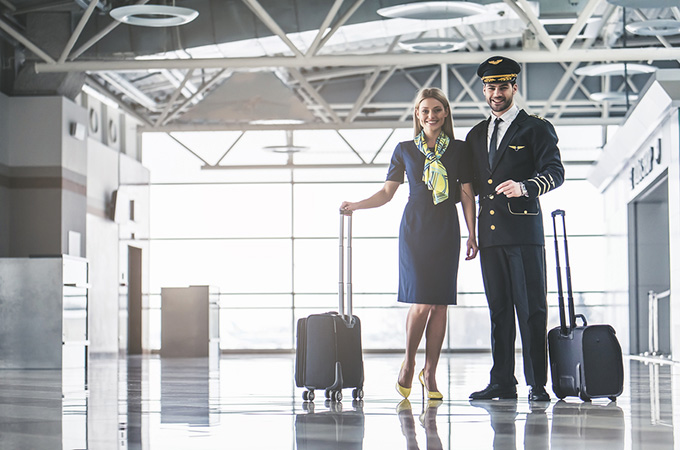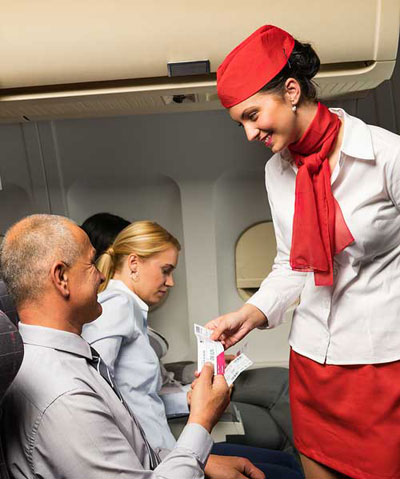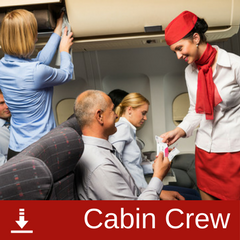We explore tax deductions for cabin crew and pilots.

What if there wasn’t a welcoming cabin crew with huge smiles when we board an airplane?
Where would we all be without that extra pillow, hot meal, or glass of wine to ease the tedium of being squeezed into an area the size of a cat bed for hours on end?
With that thought in mind, we’d like to show our appreciation and bring our friends in the skies “up to speed” about pilot and cabin crew tax deductions that you should be claiming on your tax return each year.
Do you know a member of an airline cabin crew? Please share this post so we don’t miss anybody.
The List: Tax Deductions for In-Flight Staff
Here’s how to re-claim your hard earned dollars before you head off on that next flight! The following are common – and a few not so common – cabin crew tax deductions. If you had to pay these expenses this year, you may be eligible to claim them on this year’s tax return.
Travel expenses
- Travel expenses of any kind for travelling between two places of work – for example, between two airports
- Work-related car expenses (for work-related journeys other than from home to your place of work)
- Parking fees
- Public transport and taxi fares
- Toll fees
- Short-term car hire
Accommodation expenses
- Accommodation costs when working away from home
- Meals when away from home or working overtime
- Incidental costs while away from home
Clothing and luggage bags
- Cost of an airline’s compulsory uniform
- Compulsory branded luggage bags
- General luggage bags purchased solely for work (if less than $300. If the cost was more than $300, you can only claim a deduction for its decline in value over time.)
- Dry cleaning, laundering and mending costs of the compulsory uniform
Protective items
- Skin moisturisers and re-hydrating hair conditioners
- Sunscreen and sunglasses, if your job requires you to direct passengers to or from flights out on the tarmac at airports
Work-related Equipment costs
- Mobile phone (a percentage of cost if not purchased 100% for work)
- Tablets, laptops and computers (if less than $300. If it cost more than $300, you can only claim a deduction for its decline in value over time.)
- First aid equipment
- Stationery, diaries, log books
- Work bag/briefcase
Training
- The fees for short training courses or university courses directly related to your current job.
- Course related expenses including:
- Internet (percentage used for training purposes)
- Travel costs
- Accommodation and meals (where an overnight stay is essential)
- Tools and equipment that are a requirement of the course
- Books and/or training manuals

General work-related expenses
- Subscriptions to or individual costs of journals, periodicals and magazines that have content specifically related to airline employees that is not general in nature
- Visa application fees, where a visa is a requirement for you to enter a country as part of your job
- Work-related membership, union or license fees
- Mobile phone costs for work or training related calls
- Internet costs (only the percentage used for work or training purposes)
- The cost of making up cash or bar shortages, if it is airline policy that you do
Various other expenses throughout the year can also be claimed as tax deductions. These include:
- Tax agent fees and travel to and from your tax agent
- Income protection insurance payments
- Interest paid (on investment accounts)
- Charity donations (if the charity is a registered Deductible Gift Recipient)
- Additional Superannuation payments

A few pilot and cabin crew expenses that you can’t claim
There is no shortage of cabin crew tax deductions however, the following are not eligible!
- Travel vaccination expenses cannot be claimed as tax deductions
- You cannot claim a deduction for the cost of transporting your luggage to and from the airport as this classed by the ATO as a private expense
- Travel costs paid for or reimbursed by the airline cannot then be claimed as a tax deduction
- Stockings, hosiery, socks or shoes that are not itemised as compulsory uniform
- Training or associated costs if the course is not directly related to your existing job
- Make-up, although cabin crew may be able to claim skin moisturisers and re-hydrating conditioners, make-up is not classed as an essential part of personal grooming
- Travel costs between home and the usual airport you are based at
Are you faking it?
Cabin crew tax deductions that do not sit within reasonable boundaries for your profession are likely to set off alarm bells at the ATO, who are clamping down strongly on fake or inflated tax deductions. So make sure you only claim real expenses that were honestly work-related and that you were not reimbursed for.
Etax Accountants can still help you get the very best tax refund you’re entitled to and let’s face it, our taxes go towards funding for the things everyone in Australia needs to keep our country great, so we really should all do our bit!
Cabin Crew Tax Deductions – Case study
Name: David | Experience: 5 Years | Based: Brisbane and Gold Coast
David is a Brisbane based flight attendant who works for a large airline flying out of Brisbane airport. He is saving for his first house, so he works a second job as cabin crew on a small airline that runs domestic flights out of the Gold Coast airport. He usually drives between the two airports unless there is a returning unfilled flight from Brisbane on the smaller airline, in which case he can occasionally get a free seat.
David wears a compulsory uniform when working at his main job out of Brisbane, he purchased the uniform himself. His other job only requires him to wear a tie and a hat with the airline’s logo on it. These were supplied by the airline. The only other stipulation for his clothing for his second job is a blue shirt and grey trousers.
His main job includes long haul flights and consequent ‘layovers’ (overnight stays) regularly between a good number of his flying shifts. He is given an allowance for accommodation, meals and incidental costs.
David has to maintain a level of proficiency and refreshes his knowledge for normal operations and emergency situations during the course of his job. This requires annual training and the need to keep himself up to date with changes in the industry/airline that could affect him.
As well as the relevant tax deductions listed above, David’s particular circumstances mean that he can claim the following expenses:
- Purchase, laundering and repair costs of his compulsory uniform as this clothing is worn for work only
- Dry cleaning costs for the tie and hat worn while flying with the Gold Coast airline
- Overnight accommodation and meal costs during layovers up to the amount of his allowance. To claim more than this amount, David must keep a record and diary of all expenses
- The annual course fees and other costs related to the training as it is essential for David’s current role
- David can also claim subscriptions, journals or news publications related to his work that keep him up to date with relevant areas of his industry
David can’t claim:
- The travel costs between the airports as they are both classed as his usual place of work
- The cost of the grey shirt and blue trousers for his Gold Coast job as these can be worn outside of work – even though they’re required items, they are general clothing articles with no logos, and cannot be claimed
Download a Tax Checklist for Airline and Cabin Crew
To help jog your memory and collect all the right documents and details for tax time, we’ve created a helpful tax checklist that’s personalised for airline cabin crew workers.





